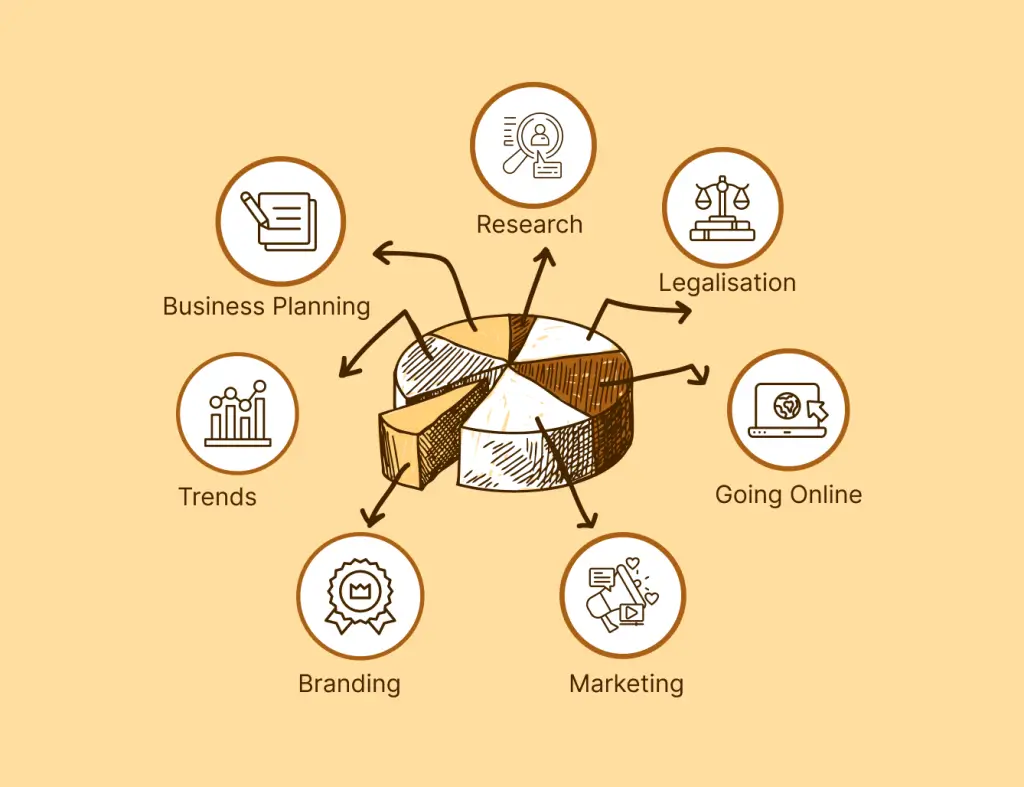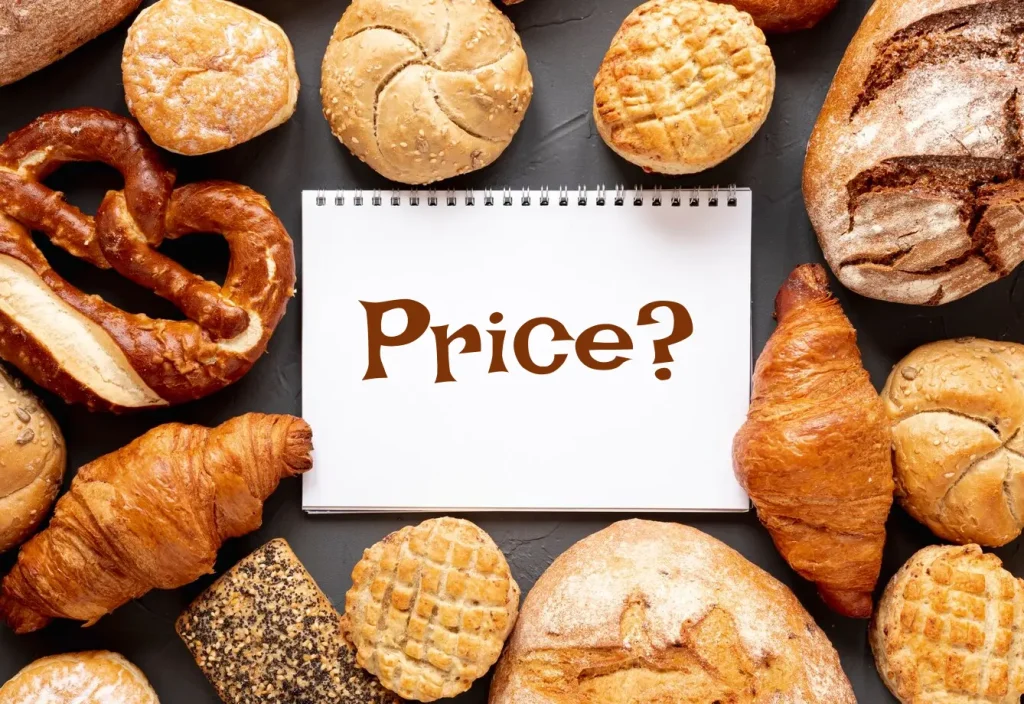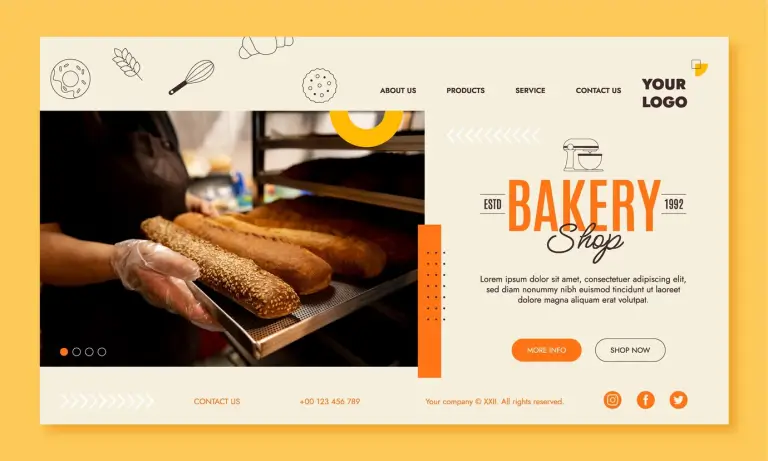The bakery business is booming now more than ever. As per Fortune Business Insights, it is a $480.23 billion industry as of 2024 and it is forecasted in the same report that this amount is going to be over $730 billion within 2032.
And there’s no doubt that a significant portion of this vast industry is shifting online. This raises the question of how to start an online bakery, as many talented bakers want to turn their skills into a career.
This blog covers everything you need to know to start an online bakery. Follow the below tasks listed as steps, do some research on your own, and make your customers fall in love with your sweet treats online.
Key Takeaways
- Know your market for better pricing and opportunities.
- Secure a business license and food safety certifications.
- A solid business plan outlines products and pricing.
- Create a user-friendly online store for customer satisfaction.
- Use SEO and social media for effective marketing.
- Build a strong brand to stand out in the market.
- Stay updated with trends to keep offerings fresh.
How to Start an Online Bakery 101

There are multiple steps you need to take to start an online bakery. Below we will explain each step in detail to help you launch your online bakery to success.
1. Conduct Market Research
Start with market research as your top priority. Initially, it won’t matter how good your baking is; making a profit out of online bakery depends on knowing what customers want, understanding your competition, setting the right prices, etc.
Niche Selection
You won’t be able to deliver every type of bakery item from day one. Focus on what you do best, doesn’t matter if it is a simple chocolate cake for birthdays or a delightful cheesecake on a stick.
At the same time, pay attention to what baked goods are in demand in your local market or culture. Consider customers with various lifestyles, including those who prefer keto-friendly or dairy-free options.
Try to develop a USP (Unique Selling Proposition) within your product so that your niche can easily stand out from your competitors.
Competitors
Analyzing your competitors is a must when you’re planning to start an online bakery. Study both local and online competitors. What are they offering, and what’s missing? A quick analysis of their strengths and weaknesses can reveal gaps that you can utilize to stand out.
Among its other benefits –
- It helps you determine if the market is saturated with competitors.
- You can gain insights into their strategies and the results they achieve.
- You can analyze their product offerings to identify which items are in higher demand.
Although it might seem unusual, as a newcomer in the online bakery business, you can learn valuable tactics by observing your competitors. As a side note, remember to always include physical pastry shops that offer home delivery as well.
Pricing

Look at competitor pricing layers to get an exclusive idea of what pricing range should be ideal for your bakery products. In general, there can be more than one price classification depending on the size, ingredients used (like Chocolate or Vanilla), and customization of the same product. For instance –
- Standard: Classic recipes with basic ingredients.
- Premium: High-quality ingredients or specialty flavors.
- Custom: Personalized designs or dietary options like gluten-free.
However, consider production costs and desired profit margin while pricing your products. Keep it competitive and affordable to maintain steady demand and profit.
2. Get Legalised

Just like other businesses, your online bakery needs to be legally registered. This is especially important since it involves food, which directly impacts health and safety.
Though you’re making mouth-watering items with care and passion, it’s important to get certified by legal authorities to customer trust and keep your business running smoothly.
Depending on your business location, these certifications differ from place to place. Some required entities are as follows –
- Food Handling License (USA): Required by most states to ensure safe food handling.
- Home Kitchen Permit (USA): Needed if baking from home; varies by state.
- Business License and Registration (USA, UK, EU): General business license and registration; also register VAT if in the EU.
- Sales Tax Permit (USA): Required if selling taxable items in the U.S.
- Food Hygiene Certification (UK, EU): Basic food hygiene training is required for food business operators.
3. Have a Proper Business Plan

You have a product but without a proper business plan, there is little chance that you can make a business out of it. These plans are strategic and cover everything from product selection to sales and delivery strategies.
Product Line
Now that you’ve chosen your niche, decide on the range of items you will offer. If there’s demand and you have the skills to bake a variety of items e.g. cookies, cakes, pastries, or custom desserts, you may consider offering a diverse menu from the start.
Production Location
Your baking location is important, be it from home or a physical shop with online ordering. If demand grows, you may need larger facilities and additional bakers. Each setup has its pros and cons in terms of cost, space, and scalability, so choose wisely.
Storage and Distribution
Most bakery items require special storage, such as cold storage to prevent spoilage. On top of that, you’ll also need a reliable delivery system that ensures timely delivery without compromising quality or appearance.
For larger operations, consider partnering with delivery services that specialize in baked goods. If your service area is small, you can handle deliveries yourself.
Also, you can explore options like in-house delivery and pickup points to efficiently dispatch large volumes of orders.
4. Set Up an Online Store

Without a website showcasing your bakery items, your business isn’t truly “online.” Your online store is the face of your brand where customers browse, order, and make transactions with ease.
A well-designed, user-friendly website streamlines the customer experience, freeing up your time to focus on fulfilling orders, preparing delicious items, and ensuring timely deliveries.
Platforms like WordPress make it easy to set up an online store, showcase products, and manage orders with limited funds. So, if you’re considering WordPress, we recommend using EasyCommerce. It’s an ecommerce plugin that can help you launch your bakery, even if you have no technical knowledge.
The plugin is designed with all essential features already built-in, so you won’t face any unnecessary complexities taking focus away from your business.
To learn more about ecommerce website cost breakdown, check out our other blog here.
- Payment Gateway: Offer multiple payment options (credit cards, PayPal, etc.) for convenience and security. EasyCommerce has dedicated add-ons for various payment solutions enabling seamless payment processing and refunds with lower transaction fees (average 1.5% to 3.5%).
- Inventory and Order Management: EasyCommerce’s automated systems effectively track stock levels and manage orders seamlessly, ensuring everything stays organized. You can quickly access summarized figures from their respective pages, providing a clear overview at a glance.
- Customer Experience: Keep the design clean and intuitive, use appealing images, and ensure a seamless checkout process so that users find it pleasant to use your website.
To learn how to start an ecommerce business, click here.
5. Marketing Essentials

Effective marketing is crucial when you start an online bakery. It plays a vital role in raising awareness and driving consistent business growth. With thousands of marketing strategies available, online marketing requires a detailed approach, where combining various tasks consistently helps you stand out and capture attention.
All marketing methods can be divided into two basic types: Organic and Paid. Balancing paid and organic strategies is ideal for maximum reach.
SEO
Optimize your website content and product pages with targeted keywords to enhance search engine visibility. Ensure your on-page SEO is on by utilizing text formatting, optimizing media files, incorporating interlinking, and providing clear slugs and meta descriptions.
Social Media Marketing
Platforms like Instagram and Facebook are perfect for sharing mouth-watering photos of your desserts. Use Stories, Reels, and interactive posts to engage followers. You can also join dedicated bakery groups where each member is a potential buyer.
Paid Ads
Run targeted ads campaign on Google and social media (Facebook, Instagram) to reach an extended user base. Compare those ad results through A/B testing to see which ads work best to improve results.
Email Marketing
Building an email list allows you to reach customers directly. Use newsletters for new product announcements, promotions, or recipes to create relationships with your customers.
6. Create a Brand
It doesn’t matter how big or small your business is, establishing it as a brand should be one of your core focuses while starting an online bakery. A strong brand sets you apart from your competitors and makes your bakery name memorable to your audience.
Begin with the fundamentals by selecting colors, fonts, and a logo that truly reflects your bakery’s style. A modern yet minimal aesthetic is ideal for a high-end bakery, while pastel colors spread more of a nostalgic or vintage feel. From day one, pay careful attention to the style of your content, including image and video quality.
Maintaining consistency and a premium vibe in all your visuals will significantly enhance your brand’s acceptance and recognition.
7. Follow or Create Trends

To get noticed and maintain long-term success online, you must explore new ideas that make your products stand out. This approach isn’t exclusive to small businesses, as well-known food franchises also adopt similar strategies to ‘stay in the game’.
Consider experimenting with new recipes periodically, such as introducing innovative flavors for croissants, as an effort to include newer additions on the menu page. Also, offering customized products, like cakes with personalized messages for birthdays, anniversaries, or holidays can help you make connections with your customers.
Moreover, update your production methods and distribution strategies regularly to minimize the time between receiving and dispatching orders.
What to Consider When Starting an Online Bakery
Online bakeries operate through the Internet to take orders, communicate with customers, and process payments. To succeed, you need to follow some proven practices.
So, when you’re ready, start an online bakery by keeping the below points in mind.
1. Quality is Key
Food is more than just taste because it can be life-threatening if not handled properly. That’s why the quality of every bakery item you are offering should never be compromised.
Providing high-quality products is also essential for earning customer trust and loyalty. Always use fresh ingredients, maintain strict cleanliness, and ensure that all items are maintained under food safety laws.
2. Ensure On-time Delivery
People don’t like waiting for food. So, delivering on time is essential for retaining customers, especially for events. Invest in reliable delivery options or plan for any unexpected delays.
Choose delivery methods that preserve food quality, especially for long-distance shipping.
3. The Customer is Always Right
Every customer should be treated with the utmost sincerity and care. Provide your best work, and maintain open, sincere communication. Respond to their questions with detailed, thoughtful replies. Excellent customer service is crucial in turning first impressions into loyal, long-term customers.
According to Meteor Space, 95% of consumers say that good customer service is the key to their loyalty to a specific brand.
4. Maintain a Reasonable Cost
The right balance between affordability and profitability is crucial, not just in online businesses but in every business.
But as online businesses have lesser upfront costs i.e. renting a physical setup or hiring additional employees to run it, the product pricing should be reduced and kept within mass consumer reach.
Also, consider seasonal discounts or package deals for large orders to attract a wider customer base.
5. Create a Community
With food as your niche, you have a unique advantage in building a community. Food naturally invites conversation, from sharing recipes and cooking tips to exploring trends and cultural flavors. This builds a loyal community that supports and promotes your business.
6. Showcase Your Products
Don’t hesitate to invest in arranging high-quality media content for your products. According to DoorDash, adding high-quality photos to your menu can increase delivery volume by 15% approx.
Display your baked goods in a way that highlights their quality and uniqueness. Create a photo gallery containing various dishes on your website, add reviews, or showcase them on social media.
Final Thoughts
Starting an online bakery takes more than just baking skills. It requires thorough planning in areas like niche selection, legal requirements, competitor analysis, website creation, marketing strategies, menu optimization, etc.
Other equally important factors include ensuring product quality, exceptional taste, and timely delivery. Remember, your hard work truly pays off when customers receive a product that’s on time and tastes extraordinary.
So, take a leap of faith, and bring your baking talents online today!
Frequently Asked Questions (FAQs)
How do I start my own bakery business from home?
To start a bakery business from home, first research your target market and ensure you meet all legal requirements, such as food handling permits.
Next, create a menu, set pricing, and establish an online presence through a website or social media. Lastly, focus on high-quality ingredients, attractive packaging, and reliable delivery to build a loyal customer base.
What are the kitchen requirements for home baking business?
A home baking business requires basic tools like mixers, ovens, baking trays, and measuring cups. Keep a clean, organized workspace with storage for ingredients and equipment.
Use food-safe containers, and fresh ingredients, and follow food safety standards. Good ventilation and temperature control are also essential for maintaining product quality.
What common mistakes do startup bakeries make?
Here are the top 5 mistakes startup bakeries often make –
1. Failing to understand customer preferences, pricing, and local competition.
2. Offering too many items without any notable specialization.
3. Poor cost management quickly cutting into profits.
4. Inconsistent product taste and presentation and
5. Insufficient and inefficient marketing efforts.

